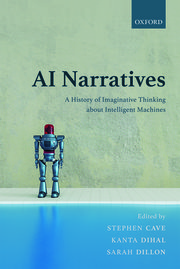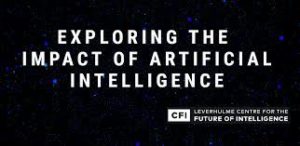One of my pre-pandemic, end of the academic year, June treats had become a trip down to London to take part in, and absorb the atmosphere and events at, the annual CogX Festival. It’s a rare event where academics, policymakers, technologists, industry people and many more come together to share knowledge around all things AI. As part of a series of public events for the Andrew W. Mellon Sawyer Seminar – Histories of AI: A Genealogy of Power – myself, co-organiser Richard Staley, and our postdoctoral research associate Jonnie Penn took part in 2021’s hybrid CogX Festival. We talked about what we’ve been doing on the Seminar for the past year, about some of the themes that have guided our discussions, and about AI and climate change. I spoke about AI and stories, drawing off the many things I’ve learnt over the course of the Seminar, thinking that has gone into and come out of the new book, Storylistening: Narrative Evidence and Public Reasoning, and research that’s informing my plans for the next book (I think!), on the intersections of AI research and literature in the mid-twentieth century.
Tag Archives: artificial intelligence
NEW BOOK PUBLISHED – AI Narratives: A History of Imaginative Thinking About Intelligent Machines (Oxford University Press)

It never fails to be an exciting moment when a book that you have worked on for years finally meets the world. My co-edited book, AI Narratives: A History of Imaginative Thinking about Intelligent Machines, is now out with Oxford University Press. Mapping AI narratives from the classical era through through to the present, the collection examines how stories about AI anticipate, and can usefully inform, many contemporary debates about the social, ethical, political and philosophical consequences of AI. It was a pleasure to work with the contributors, from whom I learnt so much and who bring such a rich range of different expertise and methodological approaches to the topic.
CONTENTS
Introduction
Imagining AI, Stephen Cave, Kanta Dihal and Sarah Dillon
PART I – ANTIQUITY TO MODERNITY
1. Homer’s Intelligent Machines: AI in Antiquity, Genevieve Liveley and Sam Thomas
2. Demons and Devices: Artificial and Augmented Intelligence before AI, E. R. Truitt
3. The Android of Albertus Magnus: A Legend of Artificial Being, Minsoo Kang and Ben Halliburton
4. Artificial Slaves in the Renaissance and the Dangers of Independent Innovation, Kevin LaGrandeur
5. Making the Machine Speak: Hearing Artificial Voices in the Eighteenth Century, Julie Park
6. Victorian Fictions of Computational Creativity, Megan Ward
7. Machines Like Us? Modernism and the Question of the Robot, Paul March-Russell
PART II – MODERN AND CONTEMPORARY
8. Enslaved Minds: Artificial Intelligence, Slavery, and Revolt, Kanta Dihal
9. Machine Visions: Artificial Intelligence, Society, and Control, Will Slocombe
10. “A push-button type of thinking”: Automation, Cybernetics, and AI in Mid-century British Literature, Graham Matthews
11. Artificial Intelligence and the Parent/Child Narrative, Beth Singler
12. AI and Cyberpunk Networks, Anna McFarlane
13. AI: Artificial Immortality and Narratives of Mind-Uploading, Stephen Cave
14. Artificial Intelligence and the Sovereign-Governance Game, Sarah Dillon and Michael Dillon
15. The Measure of a Woman: Fembots, Fact and Fiction, Kate Devlin and Olivia Belton
16. The Fall and Rise of AI: Investigating AI Narratives with Computational Methods, Gabriel Recchia
Let the Future Commence…
With Deconstruction, Feminism, Film submitted and with it a number of intellectual questions I’ve been wrestling with for over a decade put to rest, I am now delightedly embracing my research on science fiction, and on science and literature. This work began whilst I was at St Andrews and has been bubbling along over the past three years, but it took a back seat to prioritise finishing the film book. Now it gets to take centre stage! Earlier this month, I joined the Leverhulme Centre for the Future of Intelligence as a Senior Research Fellow and co-Project Lead on the AI Narratives project. I’ll be working alongside co-Project Leads Dr Stephen Cave, Executive Director of CFI, and Claire Craig, Director of Science and Policy at the Royal Society, as well as Kanta Dihal, our postdoctoral researcher and Associate Fellow, Dr Beth Singler. It’s a great team, and an exciting three year project to explore how AI is currently portrayed in literary, cinematic and other cultural narratives, what impact that might be having, and what we can learn from how other complex, novel technologies have been communicated. The Royal Society have also generously funded a more focused reboot of the What Scientists Read research I carried out with a multidisciplinary team in Scotland, so watch this space for updates on the AI Narratives project and on What AI Researchers Read…

